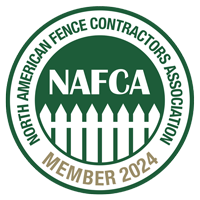Spring Fence Check-up
When inspecting your fence after the harsh winter months, there are several key aspects to assess for potential damage or wear. First, check for any visible signs of rot or decay, especially in wooden fences, where moisture can seep into the material, causing it to break down over time.
Additionally, examine the fence posts to ensure they are still firmly anchored in the ground. Winter storms and freezing temperatures can shift the soil, leading to unstable posts. Look for any cracks, splits, or warping in the fence panels or boards as these could weaken the fence's structure. Don't forget to inspect the hardware, including hinges, nails, and screws, for rust or breakage.
Finally, assess the overall cleanliness of the fence. Dirt, moss, and algae can accumulate over the winter, necessitating a thorough cleaning to preserve the fence's appearance and longevity.
Following the initial inspection, prioritize repairs to address any issues uncovered. Begin by treating areas affected by rot or decay on wooden fences, possibly requiring the replacement of severely damaged sections. For unstable posts, you may need to re-anchor or replace them to ensure the fence's stability.
Cracks, splits, or warping in panels or boards should be repaired or replaced promptly to prevent further damage. Address any rusted or broken hardware by cleaning, lubricating, or replacing them as necessary. Finally, a comprehensive cleaning of the fence using appropriate methods for the material can not only enhance its appearance but also extend its lifespan. Remember, regular maintenance and prompt repairs after winter can keep your fence in top condition, saving you money.
How long should a fence last?
The lifespan of a fence greatly depends on the materials used, environmental conditions, and how well it's maintained. Generally, wooden fences, such as those made from cedar or pine, can last anywhere from 15 to 20 years if properly treated against rot, pests, and moisture.
Vinyl fences, on the other hand, boast a longer durability, often exceeding 20 to 30 years due to their resistance to decay, pests, and weather conditions. Metal fences, including wrought iron and aluminum, can last even longer, with a lifespan that can exceed 30 years with regular maintenance to prevent rust and corrosion.
Environmental factors such as extreme weather conditions, soil quality, and exposure to moisture can significantly affect the durability and lifespan of a fence. Regular inspection, cleaning, and prompt repairs are crucial to extending the life of your fence, regardless of the material.
By adhering to a maintenance schedule and addressing small issues before they escalate, you can ensure your fence remains strong, functional, and aesthetically pleasing for many years.
When you have a free consultation with the Davis Fences team, they can assess your present fence and its condition. If necessary, they will repair your fence/Call Davis Fences in Hamilton at 905-643-9933 for a new fence or a repair!








